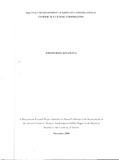| dc.description.abstract | Organizations operate in a dynamic environment; they are thus environment dependent
and environment servicing. The dynamism is propelled by globalization, the internet
revolution, hyper competition and liberalization. In order for an organization to remain
focused under such circumstances, the long term direction must be clear. The long term
direction of an organisation is defined through the process of strategy development.
Strategy development seeks to guide executives in defining the business their company is
in, the aims it seeks, and the means it will use to accomplish these aims. Practicing
managers embrace divergent views and approaches to strategy development. Such views
and approaches are often the consequence of their unique business realities. Such realities
are determined by their type of business, internal organisational factors such as resources,
product and size and external factors such as market dynamism, market size and industry
uniqueness.
Various theories have been advocated to explain the development of strategies III
organisations. The most prominent of these schools are the planning and design school
and the emergence school. None of these views may operate in isolation. Strategy
development is a complex process shaped by various forces. The best process is
ultimately that which is sensitive to all the market forces, intricately balancing them and
yet not loosing focus on the primary objective of pleasing the customer and increasing the
bottom line
State Corporations is often used to refer to corporate bodies in which the government
holds at least 50% of the equity and those enterprises whose operations are otherwise
controlled by the state. Kenyan State Corporations operate in an intricate business
environment where an elusive balance must be achieved on how to satisfy the politics of
the day and still make business logic. It is against this background that in the year 2001,
the government of Kenya developed and launched the Strategy for Performance
improvement in the Public Service. This Strategy was anchored on the need to develop a
result based management and was heavily anchored on strategic planning.
v
This study sought to establish how strategy is developed at the Kenyatta International
Conference Centre Corporation (KICC) and the challenges of the process. The KICC is a
State Corporation established through the KICC order, 2004 contained in Kenya Gazette
Supplement No. 45, Legislative Supplement No. 26 (Legal Notice No. 77) dated 9th July
2004.
Case study design was used to establish how strategy is developed at the KICC and
challenges faced in the process. Primary data was collected through personal interviews
with the respondents who are responsible for strategy development at the KICC.
Secondary data was obtained from manuals and books about the KICC. The data was
then analyzed qualitatively in order to arrive at a conclusion and make recommendations.
The study revealed that, strategies at the Kenyatta International Conference Centre
Corporation are formulated by the management team. The process of developing the
strategies is systematic and structured. The KICC has a mission statement and clearly
defined corporate directions in the form of vision statement and set core values to
position KICC for future opportunities. There is a systematic approach and deployment
of employee empowerment in which employees recite the vision, mission and core values
in staff baraza in both English and Kiswahili. The study established that brainstorming
and suggestion systems are the most common participatory tools used to obtain views.
The study identified organizational structure, inadequate resources, Lack of title to the
envisaged Corporation's land, national politics and government decisions, alignment of
organisational strategy to government strategy and poor communication as the main
challenges facing strategy development practices at the Kenyatta International
Conference Centre Corporation. | en |

